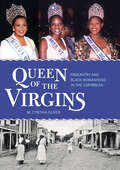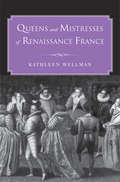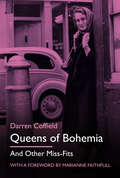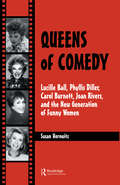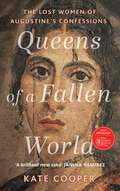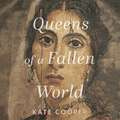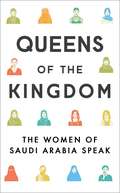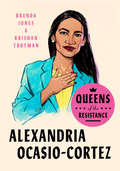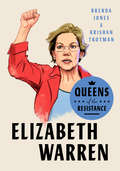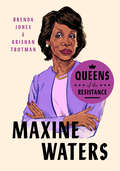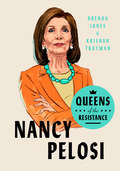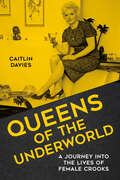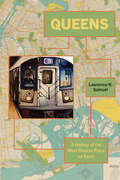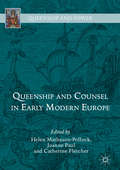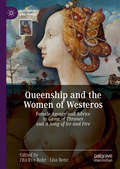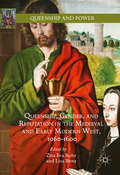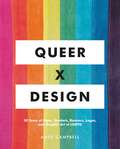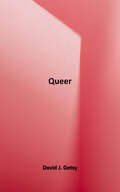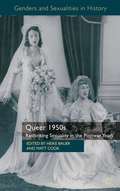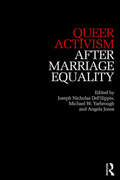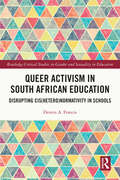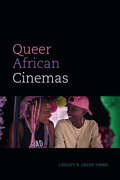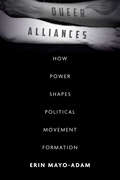- Table View
- List View
Queen of the Virgins: Pageantry and Black Womanhood in the Caribbean (Caribbean Studies Series)
by M. Cynthia OliverBeauty pageants are wildly popular in the U.S. Virgin Islands, outnumbering any other single performance event and capturing the attention of the local people from toddlers to seniors. Local beauty contests provide women opportunities to demonstrate talent, style, the values of black womanhood, and the territory's social mores. Queen of the Virgins: Pageantry and Black Womanhood in the Caribbean is a comprehensive look at the centuries-old tradition of these expressions in the Virgin Islands. M. Cynthia Oliver maps the trajectory of pageantry from its colonial precursors at tea meetings, dance dramas, and street festival parades to its current incarnation as the beauty pageant or “queen show.” For the author, pageantry becomes a lens through which to view the region's understanding of gender, race, sexuality, class, and colonial power. Focusing on the queen show, Oliver reveals its twin roots in slave celebrations that parodied white colonial behavior and created Creole royal rituals and celebrations heavily influenced by Africanist aesthetics. Using the U.S. Virgin Islands as an intriguing case study, Oliver shows how the pageant continues to reflect, reinforce, and challenge Caribbean cultural values concerning femininity. Queen of the Virgins examines the journey of the black woman from degraded body to vaunted queen and how this progression is marked by social unrest, growing middle-class sensibilities, and contemporary sexual and gender politics.
Queens and Mistresses of Renaissance France
by Kathleen WellmanThis book tells the history of the French Renaissance through the lives of its most prominent queens and mistresses, beginning with Agnès Sorel, the first officially recognized royal mistress in 1444; including Anne of Brittany, Catherine de Medici, Anne Pisseleu, Diane de Poitiers, and Marguerite de Valois, among others; and concluding with Gabrielle d'Estrées, Henry IV's powerful mistress during the 1590s.Wellman shows that women in both roles--queen and mistress--enjoyed great influence over French politics and culture, not to mention over the powerful men with whom they were involved. The book also addresses the enduring mythology surrounding these women, relating captivating tales that uncover much about Renaissance modes of argument, symbols, and values, as well as our own modern preoccupations.
Queens of Bohemia: And Other Miss-Fits
by Marianne Faithfull Darren CoffieldOur story begins in 1920s London, at a time when women’s rights were surging after the long battle for suffrage and nightclubs emerged as spaces where single women could socialise unchaperoned. This was the age of the dance craze and the gender-bending ‘Flapper’, who inspired the creation of the Gargoyle club, a nocturnal hunting ground for Femmes Fatales.Meanwhile, London’s Bohemia was ruled by the ‘Queen of Clubs’, Kate Meyrick; the taboo-breaking ‘Tiger Woman’, Betty May; the original ‘Chelsea Girl’, Viva King; the artist, Nina Hamnett; the ‘Euston Road Venus’, Sonia Orwell; and Isabel Rawsthorne, artist, spy, pornographer, model and muse … to name but a few.Using previously unpublished memoirs and interviews, Queens of Bohemia creates a soundscape of voices that gives the reader a taste of their world, so exotic and yet often wracked with despair. It offers a unique insight into a generation of women for whom ideals of duty and self-sacrifice had been debunked by the horrors of war and whose morality resided in being true to one’s self, as they took their struggle for freedom into the wider world and learned to value their individuality along the way.
Queens of Comedy: Lucille Ball, Phyllis Diller, Carol Burnett, Joan Rivers, and the New Generation of Funny Women
by Susan HorowitzThrough candid personal interviews with Lucille Ball, Carol Burnett, and other visionary performers, Queens of Comedy explores how comediennes have redefined the roles of women in not only the entertainment business, but society as a whole. Detailing both their public and private lives - as well as their many and varied performances - Queen of Comedy examines the impact these women have had on the predominantly male-oriented world of comedy. Performers like Carol Burnett, Joan Rivers, and their more recent counterparts, comediennes Brett Butler and Roseanne, have helped to sift women's roles in comedy from object to subject. This book maps out this shift, providing an often brutally honest picture of women's lives in both the spotlight of comedy and this modern world.
Queens of a Fallen World: The Lost Women of Augustine’s Confessions
by Kate Cooper'A brilliant new take' Janina Ramirez, author of Femina'A masterpiece of the historian's art' Peter Brown, author of Augustine of HippoThe powerful and surprising story of the four remarkable women who changed Augustine's life - and history - forever.While many know of St Augustine and the Confessions, few know of the women whose hopes and dreams shaped his early life: his mother, Monnica of Thagaste; his lover; his fiancée; and Justina, the troubled empress of ancient Rome. Drawing upon their depictions in the Confessions, historian Kate Cooper skilfully reconstructs their lives against the backdrop of the late Roman Empire to paint a vivid portrait of the turbulent society they and Augustine moved through. She shows how despite their often precarious position, these women tried in their different ways to influence the world around them and argues that Augustine did not end his engagement because he was called by God, but because he considered the potential marriage to be an unforgiveable betrayal of his lover.Vividly written and drawing on extensive new research, Queens of a Fallen World is essential reading for those looking for a new understanding not only of Augustine, but also of the women who shaped his life with consequences that were to change Christianity for centuries to come.
Queens of a Fallen World: The Lost Women of Augustine’s Confessions
by Kate CooperThe powerful and surprising story of the four remarkable women who changed Augustine's life - and history - forever.While many know of St Augustine and the Confessions, few know of the women whose hopes and dreams shaped his early life: his mother, Monnica of Thagaste; his lover; his fiancée; and Justina, the troubled empress of ancient Rome. Drawing upon their depictions in the Confessions, Historian Kate Cooper skilfully reconstructs their lives against the backdrop of the late Roman Empire to paint a vivid portrait of the turbulent society they and Augustine moved through. She shows how despite their often precarious position, these women tried in their different ways to influence the world around them and argues that Augustine did not end his engagement because he was called by God, but because he considered the potential marriage to be an unforgiveable betrayal of his lover.Vividly written and drawing on extensive new research, Queens of a Fallen World is essential listening for those looking for a new understanding not only of Augustine, but also of the women who shaped his life with consequences that were to change Christianity for centuries to come.(P) 2023 Hodder & Stoughton Limited
Queens of the Kingdom: The Women of Saudi Arabia Speak
by Nicola SutcliffThe Kingdom of Saudi Arabia is one of the most mysterious and secretive societies in modern times and the lives of the women living there is perhaps the most intriguing aspect of all. What do the women of Saudi Arabia really think about their lives? What are their hopes and dreams? To separate fact from fiction, Nicola Sutcliff spent four years living in the Kingdom, meeting and interviewing women of all ages and from all walks of life. Their stories are presented here and paint a portrait of a country that appears to be on the cusp of change. Meet Hafsa, a Bedouin who gave birth to eleven children in the open desert; Jamila, the first wife in a polygamous household; Aya, a medical student who married a stranger in order pursue her education. Meet these and many others and discover what they think about subjects as diverse as education, driving, the religious police, male guardianship, social media, women’s rights, love, marriage, underground parties, under-the-abaya fashion and sexuality. Authentic, eye-opening, inspiring and courageous, this candid collection of essays captures the essence of what it is like to be a woman living in Saudi Arabia today.
Queens of the Resistance: Alexandria Ocasio-Cortez (Queens of the Resistance)
by Brenda Jones Krishan TrotmanPart of the four-book Queens of the Resistance series, saluting some of the most beloved boss ladies in Congress: a celebration of AOC, the youngest woman ever to serve in Congress and its newest superstar Not long ago, no one could even imagine a twenty-eight-year-old Latina upstart running for Congress representing Queens and the Bronx: It required facing the city&’s nearly all-white, all-male political machine. But since Alexandria Ocasio-Cortez graced the scene in all her bartending, tweet-talking, mold-breaking glory, the face of politics in the twenty-first century has changed. Today, Ocasio-Cortez is a foremost advocate for progress, whipping up support among her colleagues and gaining the secret admiration of her foes. She&’s jousting with an outrageous president and a conservative media sphere that place her under relentless attack. Why? Because they fear her gift for speaking truth to power.With illustrations, deep research, and writing as endlessly quotable as she is, Queens of the Resistance pays tribute to this phenomenal woman. About the series: Each book of the Queens of the Resistance series is a celebration of the rebellion against the oppression of women and an embracement of the new in the United States government. The series is adorned with sass, discernment, and the badassery of the present and future leadership. The Doomsday Clock is at a minute to midnight, and the patriarchal power grid that lights &“the shining city on a Hill&” is about to black out. It&’s time to yield to the alternative—the power of women.
Queens of the Resistance: Elizabeth Warren (Queens of the Resistance)
by Brenda Jones Krishan TrotmanPart of the four-book Queens of the Resistance series, saluting some of the most beloved boss ladies in Congress: a celebration of Elizabeth Warren, the star senator from Massachusetts and 2020 presidential candidate All hail Queen Elizabeth! She's a &“queen" but not a monarch who's spent her life fighting to create a more equal society. Now one of the most recognizable women in politics, Warren took a winding road to become the badass senator from Massachusetts—the first woman senator ever elected from the state. Day-to-day struggle to make ends meet? Check. Single motherhood? Check. Law degree? Check. Tenured Harvard Law professor? You bet! And oh, she created a whole new government agency to protect consumers from predatory businesses. This the story of Liz&’s hard-earned rise to the top of the game.With illustrations, deep research, and writing as endlessly quotable as she is, Queens of the Resistance pays tribute to this phenomenal woman. About the series: Each book of the Queens of the Resistance series is a celebration of the rebellion against the oppression of women and an embracement of the new in the United States government. The series is adorned with sass, discernment, and the badassery of the present and future leadership. The Doomsday Clock is at a minute to midnight, and the patriarchal power grid that lights &“the shining city on a Hill&” is about to black out. It&’s time to yield to the alternative—the power of women.
Queens of the Resistance: Maxine Waters (Queens of the Resistance)
by Brenda Jones Krishan TrotmanPart of the four-book Queens of the Resistance series, saluting some of the most beloved boss ladies in Congress: a celebration of Representative Maxine Waters, who reclaimed her time and led the first calls for impeachment Maxine Waters is an icon for a generation of women powerbrokers in politics. She is an &“unbought and unbossed&” acolyte of all the legendary firebrands, like Shirley Chisholm, Barbara Jordan, Tupac, and Malcolm X. The daughter of a single mom from St. Louis, she&’s smart, sassy, and an outright firecracker. She is the first woman of color, and the first person of color, to regulate the boyz at the big banks as the powerful chair of the House Financial Services Committee. Auntie Maxine called out the crimes and corruption of this Oval Office with precision before anyone else dared to take a stand. Make no mistake, she is coming for the &“king,&” and whenever she aims, Maxine Waters doesn&’t miss. With illustrations, deep research, and writing as endlessly quotable as she is, Queens of the Resistance pays tribute to this phenomenal woman. About the series: Each book of the Queens of the Resistance series will be a celebration of the rebellion against the oppression of women and an embracement of the new in the United States government. The series is adorned with sass, discernment, and the badassery of the present and future leadership. The Doomsday Clock is at a minute to midnight, and the patriarchal power grid that lights &“the shining city on a Hill&” is about to black out. It&’s time to yield to the alternative—the power of women.
Queens of the Resistance: Nancy Pelosi (Queens of the Resistance)
by Brenda Jones Krishan TrotmanPart of the four-book Queens of the Resistance series, saluting some of the most beloved boss ladies in Congress: a celebration of the first woman Speaker of the House and a trailblazer for generations to come, Nancy Pelosi Behold one of the toughest dealers in the political arena, a singularly shrewd operator who cut her teeth from deep within the ranks of the Democratic Party and climbed all the way to the top. Rising higher than any woman ever who came before, Madame Speaker created a blueprint that those after her could follow. And now, back to her rightful place as Madame Speaker, she&’s prepared to take back power for the people . . . and at the end of it all, in characteristic class and style, she will pass on the gavel to the next generation of badass leaders.With illustrations, deep research, and writing as endlessly quotable as she is, Queens of the Resistance pays tribute to this phenomenal woman. About the series: Each book of the Queens of the Resistance series is a celebration of the rebellion against the oppression of women and an embracement of the new in the United States government. The series is adorned with sass, discernment, and the badassery of the present and future leadership. The Doomsday Clock is at a minute to midnight, and the patriarchal power grid that lights &“the shining city on a Hill&” is about to black out. It&’s time to yield to the alternative—the power of women.
Queens of the Underworld: A Journey into the Lives of Female Crooks
by Caitlin Davies‘What a brilliant piece of research; pieced together with compassion, heart and understanding. Caitlin gives voice to women who have been forgotten or have only been seen through a male prism. She wrestles back their stories’ - Maxine Peake‘A rollicking account of all kinds of crime committed by women . . . who have not only been forgotten or ignored, but who put their male criminal counterparts to shame’ Julie Bindel, The SpectatorRobin Hood, Dick Turpin, Ronnie Biggs, the Krays . . . All have become folk heroes, glamorised and romanticised, even when they killed. But where are their female equivalents? Where are the street robbers, gang leaders, diamond thieves, gold smugglers and bank robbers?Queens of the Underworld reveals the incredible story of female crooks from the seventeenth century to the present. From Moll Cutpurse to the Black Boy Alley Ladies, from jewel thief Emily Lawrence to bandit leader Elsie Carey and burglar Zoe Progl, these were charismatic women at the top of their game. But female criminals have long been dismissed as either not ‘real women’ or not ‘real criminals’, and in the process their stories have been lost.Caitlin Davies unravels the myths, confronts the lies and tracks down modern-day descendants in order to tell the truth about their lives for the first time.
Queens: A History of the Most Diverse Place on Earth (Excelsior Editions)
by Lawrence R. SamuelCharts the historical development of Queens from the 1920s to today, focusing on its profound diversity.Queens charts the history of residential development of the New York City borough from the 1920s to today. The work focuses on the borough's most remarkable aspect: its profound diversity as a multiethnic, multiracial, and multireligious place. The narrative traces the evolution of Queens from a quasi-suburb of Manhattan for the white middle class into the most diverse county in the United States and, many contend, the most diverse place on the planet. Following this trajectory adds much to our understanding of the borough, the city, the country, and even the world.
Queenship and Counsel in Early Modern Europe (Queenship and Power)
by Catherine Fletcher Helen Matheson-Pollock Joanne PaulThe discourse of political counsel in early modern Europe depended on the participation of men, as both counsellors and counselled. Women were often thought too irrational or imprudent to give or receive political advice—but they did in unprecedented numbers, as this volume shows. These essays trace the relationship between queenship and counsel through over three hundred years of history. Case studies span Europe, from Sweden and Poland-Lithuania via the Habsburg territories to England and France, and feature queens regnant, consort and regent, including Elizabeth I of England, Catherine Jagiellon of Sweden, Catherine de’ Medici and Anna of Denmark. They draw on a variety of innovative sources to recover evidence of queenly counsel, from treatises and letters to poetry, masques and architecture. For scholars of history, politics and literature in early modern Europe, this book enriches our understanding of royal women as political actors.
Queenship and the Women of Westeros: Female Agency and Advice in Game of Thrones and A Song of Ice and Fire (Queenship and Power)
by Zita Eva Rohr Lisa BenzIs the world of George R. R. Martin’s A Song of Ice and Fire and HBO’s Game of Thrones really medieval? How accurately does it reflect the real Middle Ages? Historians have been addressing these questions since the book and television series exploded into a cultural phenomenon. For scholars of medieval and early modern women, they offer a unique vantage point from which to study the intersections of elite women and popular understandings of the premodern world. This volume is a wide-ranging study of those intersections. Focusing on female agency and the role of advice, it finds a wealth of continuities and contrasts between the many powerful female characters of Martin’s fantasy world and the strategies that historical women used to exert influence. Reading characters such as Daenerys Targaryen, Cersei Lannister, and Brienne of Tarth with a creative, deeply scholarly eye, Queenship and the Women of Westeros makes cutting-edge developments in queenship studies accessible to everyday readers and fans.
Queenship, Gender, and Reputation in the Medieval and Early Modern West, 1060-1600
by Zita Eva Rohr Lisa BenzThis edited collection opens new ways to look at queenship in areas and countries not usually studied and reflects the increasingly interdisciplinary work and geographic range of the field. This book is a forerunner in queenship and re-invents the reputations of the women and some of the men. The contributors answers questions about the nature of queenship, reputation of queens, and gender roles in the medieval and early modern west. The essays question the viability of propaganda, gossip, and rumor that still characterizes some queens in modern histories. The wide geographic range covered by the contributors moves queenship studies beyond France and England to understudied places such as Sweden and Hungary. Even the essays on more familiar countries explores areas not usually studied, such as the role of Edward II's stepmother, Margaret of France in Gaveston's downfall. The chapters clearly have a common thread and the editors' summary and description of the collection is valuable in assisting the reader. The collection is divided into two sections "Biography, Gossip, and History" and "Politics, Ambition, and Scandal. " The editors and contributors, including Zita Eva Rohr and Elena Woodacre, are scholars at the top of their field and several and engage and debate with recent scholarship. This collection will appeal internationally to literary scholars and gender studies scholars as well historians interested in the countries included in the collection.
Queenship, Gender, and Reputation in the Medieval and Early Modern West, 1060-1600 (Queenship and Power)
by Zita Eva Rohr and Lisa BenzThis edited collection opens new ways to look at queenship in areas and countries not usually studied and reflects the increasingly interdisciplinary work and geographic range of the field. This book is a forerunner in queenship and re-invents the reputations of the women and some of the men. The contributors answers questions about the nature of queenship, reputation of queens, and gender roles in the medieval and early modern west. The essays question the viability of propaganda, gossip, and rumor that still characterizes some queens in modern histories. The wide geographic range covered by the contributors moves queenship studies beyond France and England to understudied places such as Sweden and Hungary. Even the essays on more familiar countries explores areas not usually studied, such as the role of Edward II’s stepmother, Margaret of France in Gaveston’s downfall. The chapters clearly have a common thread and the editors’ summary and description of the collection is valuable in assisting the reader. The collection is divided into two sections “Biography, Gossip, and History” and “Politics, Ambition, and Scandal.” The editors and contributors, including Zita Eva Rohr and Elena Woodacre, are scholars at the top of their field and several and engage and debate with recent scholarship. This collection will appeal internationally to literary scholars and gender studies scholars as well historians interested in the countries included in the collection.
Queer X Design: 50 Years of Signs, Symbols, Banners, Logos, and Graphic Art of LGBTQ
by Andy CampbellThe first-ever illustrated history of the iconic designs, symbols, and graphic art representing more than 5 decades of LGBTQ pride and activism--from the evolution of Gilbert Baker's rainbow flag to the NYC Pride typeface launched in 2017 and beyond.Organized by decade beginning with Pre-Liberation and then spanning the 1970s through the millennium, QUEER X DESIGN will be an empowering, uplifting, and colorful celebration of the hundreds of graphics-from shapes and symbols to flags and iconic posters-that have stood for the powerful and ever-evolving LGBTQ movement over the last five-plus decades. Included in the collection will be everything from Gilbert Baker's original rainbow flag, ACT-UP's Silence = Death poster, the AIDS quilt, and Keith Haring's "Heritage of Pride" logo, as well as the original Lavender Menace t-shirt design, logos such as "The Pleasure Chest," protest buttons such as "Anita Bryant Sucks Oranges," and so much more. Sidebars throughout will cover important visual grouping such as a "Lexicon of Pride Flags," explaining the now more than a dozen flags that represent segments of the community and the evolution of the pink triangle.
Queer (Whitechapel: Documents of Contemporary Art)
by David J. GetsyKey artists' writings that have influenced and catalyzed contemporary queer artistic practice. <p><p>Historically, “queer” was the slur used against those who were perceived to be or made to feel abnormal. Beginning in the 1980s, “queer” was reappropriated and embraced as a badge of honor. While queer draws its politics and affective force from the history of non-normative, gay, lesbian, and bisexual communities, it is not equivalent to these categories, nor is it an identity. Rather, it offers a strategic undercutting of the stability of identity and of the dispensation of power that shadows the assignment of categories and taxonomies. Artists who identify their practices as queer today call forth utopian and dystopian alternatives to the ordinary, adopt outlaw stances, embrace criminality and opacity, and forge unprecedented kinships, relationships, loves, and communities. <p><p>Rather than a book of queer theory for artists, this is a book of artists' queer tactics and infectious concepts. By definition, there can be no singular “queer art.” Here, in the first Documents of Contemporary Art anthology to be centered on artists' writings, numerous conversations about queer practice are brought together from diverse individual, social and cultural contexts. Together these texts describe and examine the ways in which artists have used the concept of queer as a site of political and institutional critique, as a framework to develop new families and histories, as a spur to action, and as a basis from which to declare inassimilable difference. <p><p>Artists and writers include <p><p>Nayland Blake, Gregg Bordowitz, Leigh Bowery, AA Bronson, A. K. Burns, Giuseppe Campuzano, Tee Corinne, Barbara DeGenevieve, Dyke Action Machine!, Elmgreen & Dragset, Rotimi Fani-Kayode, Simon Fujiwara, Malik Gaines, Felix Gonzalez-Torres, Gran Fury, Sunil Gupta, Hahn Thi Pham, Harmony Hammond, Sharon Hayes, Hudson, Roberto Jacoby, Derek Jarman, Isaac Julien, Mahmoud Khaled, Zoe Leonard, Lesbian Avengers, Catherine Lord, Ma Liuming, LTTR, Allyson Mitchell, Zanele Muholi, Carlos Motta, Ocaña, Hélio Oiticica, Catherine Opie, Ridykeulous (Nicole Eisenman & A.L. Steiner), Marlon Riggs, Emily Roysdon, Prem Sahib, Assoto Saint, Tejal Shah, Amy Sillman, Jack Smith, Wolfgang Tillmans, Toxic Titties, Danh Vo, David Wojnarowicz, Wu Tsang, Yan Xing, Las Yeguas del Apocalipsis, Akram Zaatari, Sergio Zevallos
Queer 1950s: Rethinking Sexuality in the Postwar Years
by Heike Bauer Matt CookThis collection brings together scholars from across the humanities in a fresh examination of queer lives, cultures and thought in the first full post-war decade. Through explorations of sexology, literature, film, oral testimony, newspapers and court records it nuances understandings of the period, and makes a case for the particularity of queer lives in different national contexts from Finland to New Zealand, the UK to the USA - whilst also marking the transnational movement of people and ideas. The collection rethinks perceptions of the 1950s, traces genealogies of sexual thought in that decade, and pinpoints some of its legacies. In so doing, it explores the utility of queer theoretical approaches and asks how far they can help us to unpick queer lives, relationships and networks in the past. "
Queer Activism After Marriage Equality (After Marriage Equality)
by Angela Jones Joseph Nicholas DeFilippis Michael W. YarbroughQueer Activism After Marriage Equality focuses on the implications of legal same-sex marriage for LGBTQ social movements and organizing. It asks how the agendas, strategies, structures and financing of LGBTQ movement organizations are changing now that same-sex marriage is legal in some countries. Building on a major conference held in 2016 entitled "After Marriage: The Future of LGBTQ Politics and Scholarship," this collection draws from critical and intersectional perspectives to explore the questions and issues facing the next chapter of LGBTQ activism and social movement work. It comprises academic papers, international case studies, edited transcripts of selected conference sessions, and interviews with activists. These take a critical look at the high-profile work of national and state-wide equality organizations, analyzing the costs of winning marriage equality and what that has meant for other LGBTQ activism. In addition to this, the book examines other forms of queer activism that have existed for years in the shadows of the marriage equality movement, as well as new social movements that have developed more recently. Finally, it looks to examples of activism in other countries and considers lessons U.S. activists can learn from them. By presenting research on these and other trends, this volume helps translate queer critiques advanced during the marriage campaigns into a framework for ongoing critical research in the after-marriage period.
Queer Activism in South African Education: Disrupting Cis(hetero)normativity in Schools (Routledge Critical Studies in Gender and Sexuality in Education)
by Dennis A. FrancisOffering a vital, critical contribution to debates on gender, sexuality and schooling in South Africa, this book highlights how South African educational practices, discourses and structures normalize cisheteronormativity, along with how these are resisted within schools and through contemporary forms of activism. Not only does it add fresh insights to the existing research literature on gender, sexualities and schooling, it also underscores the valuable contributions of queer and transgender social movements, which have made influential legislative, teaching, learning and support contributions to education. Drawing on ethnographic research with queer and transgender activists, teachers, school managers, parents and school attending youth, the book provides everyday real-life quotes and observations offering a deeply critical contribution to the debates on gender and sexualities, education and activism. Using spatial and affect theories, it troubles the assumptions that frame this field of research to make a novel contribution to the national and international literature and research. The book provides research-based insights for thinking about and calls for informed action to challenging cisheteronormativity within and beyond schools.
Queer African Cinemas (a Camera Obscura book)
by Lindsey B. Green-SimmsIn Queer African Cinemas, Lindsey B. Green-Simms examines films produced by and about queer Africans in the first two decades of the twenty-first century in an environment of increasing antiqueer violence, efforts to criminalize homosexuality, and other state-sanctioned homophobia. Green-Simms argues that these films not only record the fear, anxiety, and vulnerability many queer Africans experience; they highlight how queer African cinematic practices contribute to imagining new hopes and possibilities. Examining globally circulating international art films as well as popular melodramas made for local audiences, Green-Simms emphasizes that in these films queer resistance—contrary to traditional narratives about resistance that center overt and heroic struggle—is often practiced from a position of vulnerability. By reading queer films alongside discussions about censorship and audiences, Green-Simms renders queer African cinema as a rich visual archive that documents the difficulty of queer existence as well as the potentials for queer life-building and survival.
Queer Airwaves: The Story of Gay and Lesbian Broadcasting
by Michael C Keith Phylis W JohnsonThis book is both a retrospective history of the gay community's use of electronic media as a way of networking and creating a sense of community, and an examination of the current situation, an analysis and critical assessment of gay/lesbian electronic media. Keith and Johnson use original interviews and oral history to delineate the place of electronic media in the lives of this increasingly visible and vocal minority in America.
Queer Alliances: How Power Shapes Political Movement Formation
by Erin Mayo-AdamA unique investigation into how alliances form in highly polarized times among LGBTQ, immigrant, and labor rights activists, revealing the impacts within each rights movement. Queer Alliances investigates coalition formation among LGBTQ, immigrant, and labor rights activists in the United States, revealing how these new alliances impact political movement formation. In the early 2000s, the LGBTQ and immigrant rights movements operated separately from and, sometimes, in a hostile manner towards each other. Since 2008, by contrast, major alliances have formed at the national and state level across these communities. Yet, this new coalition formation came at a cost. Today, coalitions across these communities have been largely reluctant to address issues of police brutality, mass incarceration, economic inequality, and the ruthless immigrant regulatory complex. Queer Alliances examines the extent to which grassroots groups bridged historic divisions based on race, gender, class, and immigration status through the development of coalitions, looking specifically at coalition building around expanding LGBTQ rights in Washington State and immigrant and migrant rights in Arizona. Erin Mayo-Adam traces the evolution of political movement formation in each state, and shows that while the movements expanded, they simultaneously ossified around goals that matter to the most advantaged segments of their respective communities. Through a detailed, multi-method study that involves archival research and in-depth interviews with organization leaders and advocates, Queer Alliances centers local, coalition-based mobilization across and within multiple movements rather than national campaigns and court cases that often occur at the end of movement formation. Mayo-Adam argues that the construction of common political movement narratives and a shared core of opponents can help to explain the paradoxical effects of coalition formation. On the one hand, the development of shared political movement narratives and common opponents can expand movements in some contexts. On the other hand, the episodic nature of rights-based campaigns can simultaneously contain and undermine movement expansion, reinforcing movement divisions. Mayo-Adam reveals the extent to which inter- and intra-movement coalitions, formed to win rights or thwart rights losses, represent and serve intersectionally marginalized communities—who are often absent from contemporary accounts of social movement formation.
